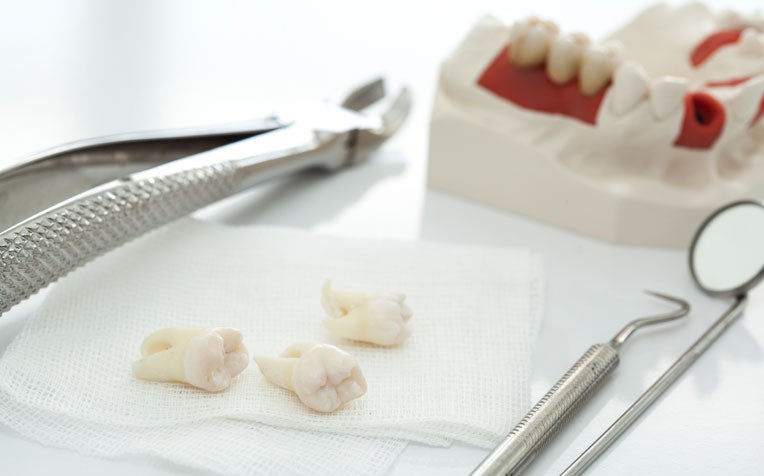HealthXchange will NEVER ask you to transfer money over a call. If in doubt, call the 24/7 ScamShield helpline at 1799, or visit the ScamShield website at www.scamshield.gov.sg.
Diabetes and Teeth: FAQ on Wisdom Teeth, Dentures and More

Diabetics do not require special precautions for routine extractions.
Dr Chee Hoe Kit, Consultant, Periodontics Unit, Department of Restorative Dentistry, National Dental Centre Singapore (NDCS), a member of the SingHealth group, answers some frequently asked questions about diabetes and oral health:
Q. Should I have my wisdom tooth removed, and what if the bleeding (after the tooth extraction) doesn’t stop?
A. It is not necessary to have your wisdom tooth removed if it is not impacted or buried and doesn’t trap food that can potentially affect adjacent teeth. If there is uncontrolled bleeding after a tooth extraction, bite firmly onto a clean gauze or handkerchief that’s placed over the wound, for at least 15-30 minutes. Avoid vigorous exercise, alcohol, very hot food or drink, for the rest of the day to minimise the risk of excessive post-operative bleeding. Do not rinse the wound area unnecessarily, or suck ice cubes, after the tooth extraction as this will disturb the blood clot that has formed inside the wound and stimulate bleeding again. If profuse bleeding persists despite the gauze-bite, return to the dental clinic or go to Accident & Emergency department at the nearest hospital.
Q. Do people with diabetes take longer to recover after a wisdom tooth extraction and other dental surgical procedures, than non-diabetics?
A. According to a large Australian study carried out in 2013, there is similar healing time between people with type 2 diabetes who are on oral hypoglycaemic medication, and non-diabetics. The healing period of the wound after tooth removal (about one week) for a person with diabetes is comparable to a non-diabetic. The study also concluded that people with diabetes do not require special precautions for routine extractions. However, the blood glucose level and/or haemoglobin A1c (HbA1c)target of a person with diabetes should be optimal before a tooth extraction, to prevent post-surgical complications. Thus, if your blood sugar is well-controlled with your HbA1c status preferably less than 7%, then your tooth extraction or oral surgical wound should not heal longer than a non-diabetic.
Q. Can I wear dentures if I have diabetes?
A. Yes, it is perfectly alright for a person with diabetes to wear dentures, if required. However, dentures should be removed before sleeping because less saliva is produced during sleep, hence there will be more accumulation of plaque bacteria on the denture and the supporting teeth during sleep.Generally, it is not advisable to wear dentures round-the-clock because the gum tissues, covered constantly with denture material, will become irritated.
Q. Can I wear braces if I have diabetes?
A. Yes. However, you need to keep your oral hygiene really good as braces tend to trap food and dental plaque easily.
Q. Will I be able to use a mouth guard (because I suffer from teeth bruxism) when I sleep?
A. Yes but you should remember to brush your teeth very clean before and after sleep since the mouthguard traps dental plaque around the teeth easily.
Q. Will my gums recede faster if I have diabetes?
A. Your gums should not recede faster if your blood sugar level is well-controlled, and if you don’t have untreated gum disease. However, if you brush your teeth improperly with excessive force using a hard bristle toothbrush, your gums may recede faster even if you have no diabetes.
Ref: P16
Contributed by
Related Articles
Conditions & Treatments
Public Events
Get the Health Buddy App
© 2025 SingHealth Group. All Rights Reserved.


















 Get it on Google Play
Get it on Google Play